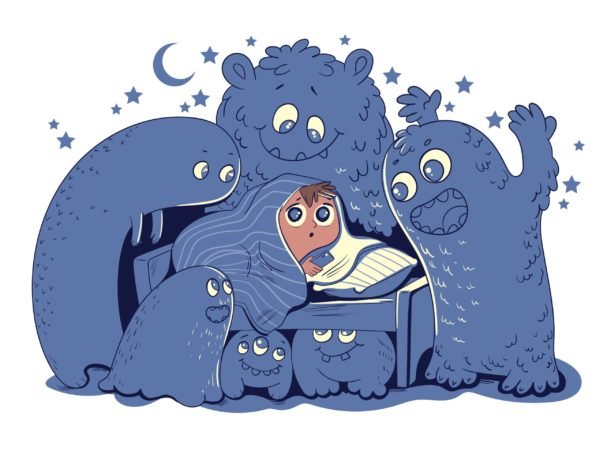Whether it’s the monster in the closet, the giant clown hiding under the bed, or the Wicked Witch of the West brandishing her broomstick, we’ve all had nightmares. For kids, nightmares typically begin around 2 years of age and peak between 3-6 years. In addition to nightmares, there are night terrors, which tend to strike around the 4-year mark, although they’ve been reported in kids as young as 18 months. Although night terrors sound and look terrifying, they’re not as common as nightmares, and kids don’t remember them. Parents, on the other hand, are left white-knuckling it for the rest of the night.
Get Wise(r) About Nightmares and Night Terrors Below…
Nightmares vs. Night Terrors: What’s the Difference?
Nightmares are bad dreams that occur in the second half of the night during REM sleep (the dream portion of sleep). Kids are frightened by these dreams and can recall many of the terrifying details. With some coaxing, they (usually) go back to sleep.
Night terrors, on the other hand, aren’t dreams per se, but represent a “fear response” that’s evoked in some kids when they transition from deep sleep to a lighter stage of sleep. Night terrors take place during the first third of the night, roughly 2-3 hours into sleep.
Night terrors can be jarring for the toughest of parents because kids appear agitated and often scream bloody murder during them. During a night terror, the child may have a blank expression on his/her face and not even recognize his/her parents. Fortunately, kids go back to sleep pretty easily after a night terror and wake up having no memory of the episode.
PediaTrivia:

Night terrors tend to run in families. In fact, 80% of kids with night terrors have a family member who either had night terrors or were prone to sleepwalking.1 Sleepwalking (like night terrors) occurs during non-REM sleep. Because of this, sleepwalkers don’t usually remember their sleepwalking episodes, either.
Managing Nightmares

Nightmares are Usually Nothing to Worry About and Lessen Over Time. Here are Some Tips to Manage Nightmares:
- Listen and Empathize: Allow your child to talk about his/her nightmare (when he/she is verbal enough to do so). Reassure him/her that the dream “wasn’t real,” but avoid perseverating on this fact. Even though the nightmare wasn’t real, it felt “real” and you don’t want to get into an existential debate about it in the middle of the night. You also don’t want your child to think that you’re an out-of-touch adult who just doesn’t understand.
- Empower Your Child: If your kiddo insists that a monster is under his/her bed or crib, check with a flashlight. Then come up with a “plan” to manage the monster if he/she comes back. For example, your toddler can “defend” him/herself against it or make friends with it. When your child is a bit older, you can teach him/her to take control of the nightmare by rewriting its ending or by having him/her draw a picture of it and tearing it up.
- Maintain a Predictable and Calming Bedtime Routine.
- Invest in a Nightlight.
- Offer Your Child a Transitional Object Such as a Teddy Bear or a Blankie.
- Hang a Dreamcatcher on the Wall or From the Ceiling.
Safety Tip: Make sure the dreamcatcher is out of reach and doesn’t have any loose strings dangling off it or other pieces that your child could tug on.
- Teach Your Child Mindfulness and Relaxation Techniques.
For inspiration, try the kid’s sections of the Headspace and Insight Timer apps.
- Have Your Child Listen to Peaceful Music or a Soothing Story Before Bed.
PediaWise Pick: Check out the Moshi app.
- Stay With Your Child Until He/She Falls Back Asleep.
PediaTips:
- Resist the temptation to sleep with your child after the nightmare. Why? Because you may end up falling into a co-sleeping habit that’s hard to break. Plus, it may send your child the message that he/she needs your protection and can’t handle the nightmare on his/her own.
- If your child has a recurring nightmare that causes him/her stress, probe a bit deeper to see if the dream is a manifestation of some deeper fear or anxiety. Most bad dreams are just dreams (sorry Freud!) but let the pediatrician know if there’s a pattern to the nightmares especially if they seem to be affecting your child’s overall wellbeing and mood throughout the day.
Managing Night Terrors

Night terrors are a bit trickier to manage than nightmares because they’re so disturbing to witness and the child has no idea what’s going on. Although night terrors are benign, it can be unnerving for parents to see their child seemingly possessed. Here are a few tips to manage night terrors:
- Reduce Stress and Fatigue: Night terrors are often triggered by stress and fatigue, so try to minimize both at home.
- Consider Waking Your Child Up Before the Night Terror Occurs: Some parents have had success waking their child up 15-30 minutes before the expected episode in an effort to disrupt the sleep cycle. Although waking a child up always sounds like a bad idea, it can be helpful in this case.
Caution: Waking a child up during the sleep terror, has not been proven to be helpful, and can actually be disorienting and anxiety-provoking for the child.
- Remind Yourself That Your Little One Won’t Remember His/Her Night Terror, No Matter How Intense It Looks.
The Bottom Line
Sleep issues are common during childhood and tend to wax and wane over time. Kids tend to outgrow sleep terrors by age 12 and nightmares dissipate with age but don’t fully disappear.
Why Don’t Nightmares Go Away As We Get Older? Researchers believe that nightmares may serve a purpose and, as a result, haven’t been weeded out of our lives by evolution. The exact purpose of nightmares, however, remains murky. Some experts believe nightmares had a protective quality for our cavemen and cavewomen ancestors. For example, a nightmare about a wooly mammoth would keep the fear of certain predators alive and prevent our distant relatives from letting down their guard. Although wooly mammoths may be out of the picture now, we have other stressors to deal with.
Another theory is that nightmares help us process conflicts and difficult emotions in our lives and act as a “dress rehearsal” for managing them.
So, the next time your child wakes up from a nightmare, be comforted by the fact that his/her middle of the night freak-out is likely benefiting him/her in some way.





